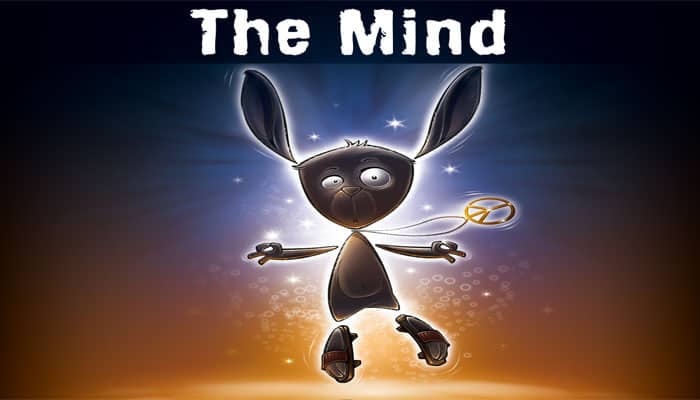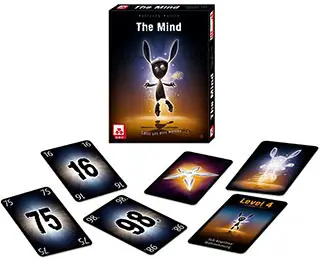
All players form a single team. In the first round (level 1) each player receives 1 card, in the second round (level 2) they receive 2 cards, and so on.
At each level the team members must put down all their cards in increasing order in the center of the table on an open stack, one after the other. For example (4 players, level 1): 18-34-41-73. The players do not take turns in any particular order.
Whoever wants to put down a card, simply does so. Watch out, here's where it gets interesting: the players must not disclose anything about their own cards - no sharing of information, no secret signals. So how does it actually work?

Components
- 100 number cards (1-100)
- 12 levels (1 - 12)
- 5 lives
- 3 throwing stars
- Instructions
Object of the Game
The Mind is a game of synchronization which relies on your sense of time. The lower a card is, the earlier it will be played. A 5 would be played pretty swiftly, whereas an 80 is likely to be held in the player's hand for a while.
Over the course of the game, the players become increasingly synchronized in terms of their sense of time, so they get better and better at estimating how much time needs to pass before playing a particular number card. What appears initially to be pure luck, becomes a real "skill" after playing for a while.
So, to concentrate at the start of each level it might be more appropriate to say: "We're getting in synch!" It should be emphasized at this point that this is not a question of counting off the seconds.
There is no counting. Of course, time passes by "in the head" of each player, but this is normally quicker than one second per number and it changes depending on what level is being played.
The secret of the game is developing that collective feeling for "now is the moment". The team has to work in harmony. The team must become ONE!!
Setup
The team is given a certain number of lives and throwing stars that are laid out openly on the table. The remaining lives and throwing stars are set aside at the edge of the table.
They may be needed later. Now a certain number of level cards are stacked one on top of the other in ascending order and placed as an open deck (with level 1 right at the top) alongside the lives and the throwing stars. Unused levels are returned to the box.
- 2 players: levels 1 -12, 2 lives, 1 throwing star
- 3 players: levels 1 -10, 3 lives, 1 throwing star
- 4 players: levels 1 - 8, 4 lives, 1 throwing star
The 100 number cards are shuffled. Each player is dealt one card (for level 1) which they hold in their hand so that none of the other players can see it. The remaining number cards are placed face down at the edge of the table.


Example: Tim, Sarah and Linus are ready for level 1. Each of them receives 1 card, which they hold so that nobody can see anyone else's cards. The 3-person team starts with 3 lives and 1 throwing star. The levels go from 1 - 10.
Important: once the players understand the rules, we recommend they simply start playing and avoid reading the box at the end of the playing instructions before the first session so they can discover the game's secret themselves.
There is a risk of losing a life right at the beginning, but the reward will be a really special "Aha!" moment. If you rarely play this kind of game, you should read the note in the box at the end of the playing rules now.
Game Play
Concentration please: each player who is ready to tackle the current level places one hand palm down on the table. Once everyone is ready, they remove their hands from the table and the game begins.
Note: this collective concentration on the level is vitally important for successful survival! As the game progresses, players are permitted to refocus their concentration at any time.
Simply say "stop" to interrupt play - everyone places a hand on the table - refocus - remove hands - and the game goes on!
The cards which the players hold in their hands must be placed in the center of the table in ascending order. The lowest (available) card must be put down first, then the second-lowest (available) card must be placed on top, and so on.
The cards are always put down one at a time. If a player has, for example, the 36 and the 37 in their hand, they may play them immediately one after the other - but they are put down one at a time! The players do not take turns in any particular order.
Whoever believes they have the lowest card currently available, simply plays it.
Important: none of the players is permitted to disclose any of their card values or show them to another player. There must be absolutely no consultation between the players, and no secret signals either!
If the players place all their cards in the correct sequence (in ascending order), they have completed the current level!


Example: Tim, Sarah and Linus place one hand on the table - they are ready. They remove their hands from the table and the game begins. Linus places his card face up in the center of the table, it shows the number 17.
Sarah places the 28 on top of this 17. Tim places the 55 on top of the 28. All in ascending order, everything is correct - level 1 completed!
The Next Level
The uppermost level card in the stack is placed in the box. All 100 number cards are shuffled again and each player is dealt the relevant number of cards, as determined by the new level.
The players take their cards in one hand, place the other hand on the table to concentrate, then they start the next level. Once again all cards must be placed in ascending order on a stack in the center of the table.
Example: Tim, Sarah and Linus play level 2. Each player now has 2 cards in their hand. Each of them places a hand on the table to focus their concentration before play is started.
Sarah places the 7 in the center of the table, Linus plays the 11, Tim plays the 35 and the 47, Linus plays the 81, Sarah the 94. All in ascending order, everything is correct - level 2 completed!
The game continues like this for each level in turn. For each new level, all 100 cards are always shuffled and each player is dealt one more card than in the previous round.
Important: each player must always play the lowest card they are holding. For example, if Tim has the 21, 56 and 93 in his hand, he must play the 21 first.
Rewards (Levels 2, 3, 5, 6, 8, 9)

Once the team has successfully completed level 2, they receive one throwing star as a reward. One throwing star is taken from the edge of the table and is added to the current throwing stars.
There are also rewards for completing levels 3, 5, 6, 8 and 9 which are taken from the edge of the table by the team. In each case, the reward is depicted in the bottom right corner of the level card (1 life or 1 throwing star).
Note: in the ideal scenario the team can possess a maximum of 5 lives and 3 throwing stars.
Error When Playing Cards: Lose 1 Life
If someone plays a number card in the wrong order, the game is halted immediately by whichever player (or players) holds a lower value card than the one played.
This causes the team to lose one of its lives, and a life card must be taken away and placed at the edge of the table. Next, any cards being held which are lower than the last one played must be set aside. Then the team refocuses their concentration and continues with the current level (it isn't started again!).
Sarah plays the 34. Tim and Linus shout "stop". Tim has the 26 in his hand, Linus has the 30. One life is discarded. Tim places his 26 to one side, and Linus does the same with his 30. The team refocuses their concentration and the game continues.
Playing a Throwing Star
At any point during a level, a player can suggest that a throwing star be played - this is signaled by raising a hand. If all the players agree, the throwing star is deployed and each player discards the lowest card in their hand by placing it face up to one side.
One throwing star is then set aside. Next, all the players refocus and the game continues.
End of the Game
If the team succeeds in completing all the levels in the stack, a collective victory has been achieved! If the team loses its last life, the endeavor has unfortunately failed.
New Challenge
If the team successfully completes all the levels in the stack (and is dancing joyfully on cloud nine), play goes on immediately in blind mode.
The team starts again at level 1 with all its remaining lives and throwing stars, but this time all the cards are played face down on the deck in the center of the table. At the end of the level, this stack is turned over and the sequence of cards is checked.
If a player has made a mistake, this costs one life. The remaining rules are unchanged. How many levels can the team complete blind?
Continue Reading

